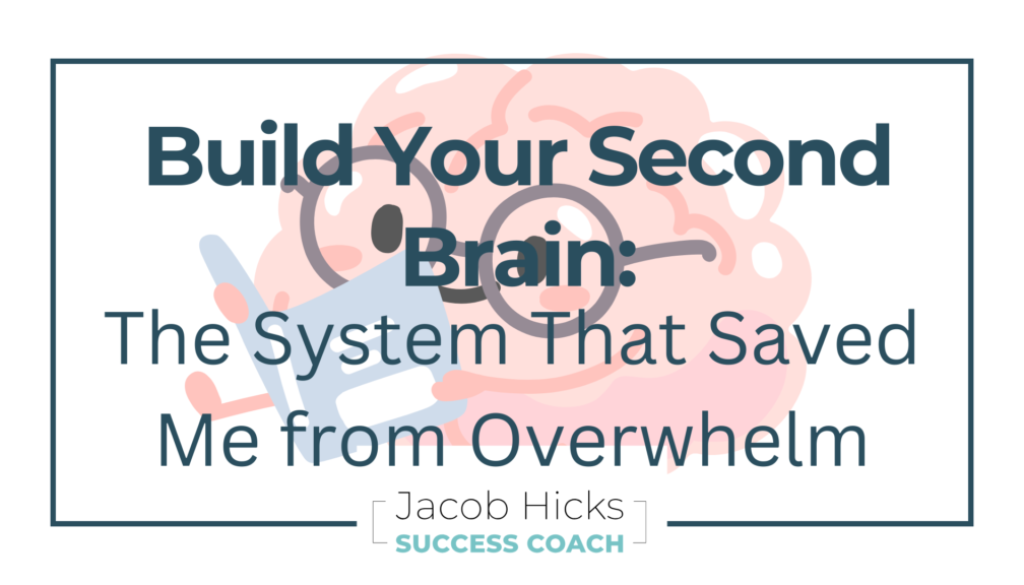Build Your Second Brain
Build Your Second Brain: The System That Saved Me from Overwhelm
Finals week in college. You know the scene: caffeine-fueled panic, students buzzing around campus, typing frantically, and reciting notes under their breath. I was right there with them—five finals, three essays, and two group projects.
I thought I had everything under control until I sat down at a table in the library. The hard, uncomfortable chair beneath me, the faint smell of burnt coffee in the air, and the carved name “John” under the table reminded me of the mountain of work ahead. My mind raced. I felt like I was drowning in tasks, and I was certain I would drop something important.
Then, I did the one thing that always brings me back from the brink—I wrote everything down. Every final, every essay, every micro-task: draft the outline, research the sources, even schedule breaks.
And suddenly, I could breathe again.
That was the first time I experienced the power of what I now call my “second brain.”
Why This Is Important
That moment in college showed me something critical: You can’t carry everything in your head. When life piles up, your mental capacity hits a ceiling fast.
Our brains are built for creativity and problem-solving—not for juggling endless to-do lists. When we push them to do both, we lose more than productivity. We lose clarity. We lose calm. We lose momentum.
But when you build a second brain—a system that holds your tasks and responsibilities—you free up mental space to focus on what matters most. You get to work with purpose, instead of scrambling just to stay afloat.
What You Can Do
For me, my second brain became Todoist. Over the last decade, it evolved from a finals week survival tool into the backbone of both my personal and professional life.
Here’s how you can build your own second brain:
- Pick Your System: Apps like Todoist, Notion, or even a simple notebook can work. I swear by Todoist because it syncs across my laptop and phone seamlessly.
- Dump Everything Out of Your Head: Write it all down. Every project, every task, every tiny step. Get it out of your brain and onto the page.
- Automate Recurring Tasks: Set reminders for the non-negotiables. I review my finances on the first of every month—Todoist reminds me without fail.
- Break Big Tasks into Subtasks: Cleaning on Saturdays becomes “dust surfaces,” “sweep floors,” “disinfect counters.” Small wins build momentum.
- Make It Visible: Keep your system in front of you. I use the Todoist widget on my phone so my daily priorities are staring at me every time I unlock it.
- Tweak as You Go: No system is perfect on day one. Experiment. Adjust. Build what works for you.
Sales Power Move
A second brain keeps your tasks on track—but what about your mindset?
Years after college, I landed in a job that felt all wrong. Leadership was disconnected. The culture pushed profits over people. By Sunday afternoon, my stomach knotted up just thinking about Monday. That dread started creeping into every evening.
I realized I needed more than a task system—I needed a perspective shift.
So, I added a simple daily task: “Write down one reason I’m grateful for this job.”
Some days it was easy. Other days, I was scraping the bottom of the barrel: “Grateful for a paycheck.” “Grateful for lunch breaks.” “Grateful I’m learning what kind of company I don’t want to work for.”
But that simple habit reshaped my mindset. The job didn’t change, but I did. I endured. I stayed focused until I found something better.
Gratitude isn’t just a feeling. It’s a discipline that rewires your brain for resilience.
The Moment It All Clicked
I’ll never forget the call. The new job offer.
I stepped outside into the sun. The weight lifted. Heart racing, I knew the gratitude practice and my second brain system had gotten me through. They carried me through the hard days and set me up for the breakthrough.
That’s when I knew: Productivity isn’t just about getting more done—it’s about helping you survive the storm and come out stronger on the other side.
Final Thought
If you’re feeling overwhelmed, start small:
- Build your second brain. Write it all down.
- Automate the essentials. Set recurring tasks.
- Anchor your mindset. Practice daily gratitude.
The fog will lift. You’ll breathe easier. You’ll start moving forward again.
And you might just find yourself further along than you ever imagined.
